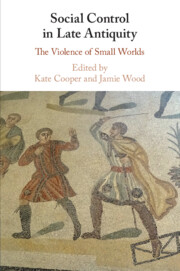Book contents
- Social Control in Late Antiquity
- Social Control in Late Antiquity
- Copyright page
- Contents
- Contributors
- Preface and Acknowledgements
- Abbreviations
- Introduction
- Part I Women and Children First
- Part II ‘Slaves, be subject to your masters’
- Part III Knowledge, Power, and Symbolic Violence
- Chapter 8 John Chrysostom and the Strategic Use of Fear
- Chapter 9 The Fear of Belonging
- Chapter 10 Words at War
- Chapter 11 Of Sojourners and Soldiers
- Chapter 12 Coercing the Catechists
- Part IV Vulnerability and Power
- Bibliography
- Index
Chapter 11 - Of Sojourners and Soldiers
Demonic Violence in the Letters of Antony and the Life of Antony
from Part III - Knowledge, Power, and Symbolic Violence
Published online by Cambridge University Press: 18 September 2020
- Social Control in Late Antiquity
- Social Control in Late Antiquity
- Copyright page
- Contents
- Contributors
- Preface and Acknowledgements
- Abbreviations
- Introduction
- Part I Women and Children First
- Part II ‘Slaves, be subject to your masters’
- Part III Knowledge, Power, and Symbolic Violence
- Chapter 8 John Chrysostom and the Strategic Use of Fear
- Chapter 9 The Fear of Belonging
- Chapter 10 Words at War
- Chapter 11 Of Sojourners and Soldiers
- Chapter 12 Coercing the Catechists
- Part IV Vulnerability and Power
- Bibliography
- Index
Summary
This chapter contrasts two parallel views of demons and their disruption of the ascetic life which coexisted in fourth-century Egypt. It rests on the hypothesis that we can read discussion of the nature, mode, and location of demons and the violence they work upon the ascetic as a medium for creating religious subjectivities in relation to a non-human adversary. Examination of each ascetic teacher’s demonology therefore reveals their vision for the ascetic life, its urgency and potentials, as well as the precarity and vulnerability an ascetic could expect to experience. The demons in the Letters of Antony manipulate the thoughts, impulses, and emotions of the individual. Their work occurs inside the person and exploits the weakness of the human mind and body. For Athanasius, in contrast, demons function primarily in an external, corporeal, and physically violent mode. Athanasius locates the ascetic life in a large-scale conflict with demons who do not merely corrupt the monk’s perceptions and emotions, as in the Letters, but also turn out in gangs and beat him senseless. This introduction of physicalised and externalised violence into the ascetic work of Antony moves the readers far away from the process of careful reflection and discernment of one’s emotions and thoughts which the Antony of the Letters had encouraged as a defence against internally located demons. This project of comparative reading shows that Antony and Athanasius have diverging and partially incompatible notions of the human predicament and therefore also of the ethical urgencies to which a human being is subject, suggesting that there is substantial diversity within early Christian ascetic thinking which goes far beyond any issue of doctrine. By focusing on each teacher’s account of demonic violence, we can see how violence interacts with the ethical imagination, bodies, and monastic pedagogy.
Keywords
- Type
- Chapter
- Information
- Social Control in Late AntiquityThe Violence of Small Worlds, pp. 232 - 255Publisher: Cambridge University PressPrint publication year: 2020
- 1
- Cited by



